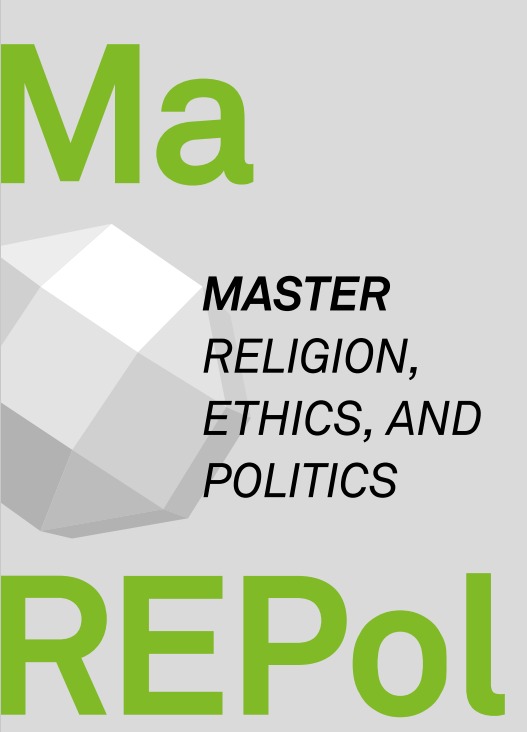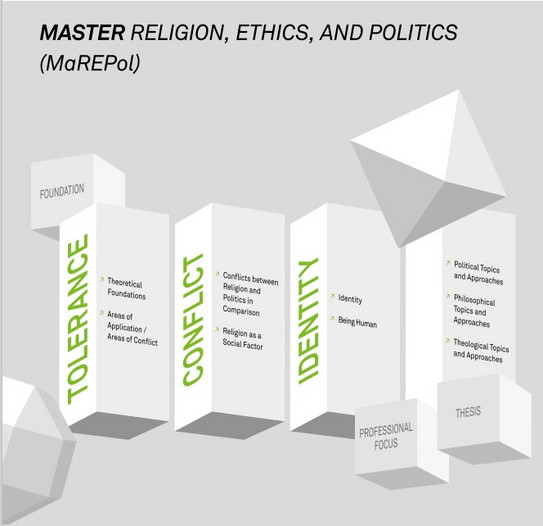Study Program
Master's Program 'Religion, Ethics, and Politics'
The tense relationship between religion and politics is one of the most critical social issues of our time. Societal and scientific debates on the issue have been triggered by increasing religious pluralization, changing moral concepts, but also globalization, and migration. How tolerant should societies be of religious groups and their rituals and practices? What values, such as equal rights for women and men, should not be open to discussion? What possibilities exist for cooperation between the state and religious communities, and where is a potential for conflict? How does religiousness or non-religiousness affect our identity? These are concrete sample questions that MaREPol deals with.
MaREPol examines the relationship between religion, politics, and society from theological, philosophical, and political science perspectives. Students learn to address and understand the interaction between these spheres as well as the challenges that result from this complex field of tension and to develop interdisciplinary solutions.

In doing so, they deal with the ethics and aesthetics of religions, analyze the relationship between religion and state in political systems, or discuss theological justifications for the political engagement of religious communities.
Course of Study
MaREPol brings philosophical, political science, and theological perspectives systematically together. The program covers all disciplines in ten modules, which take place interactively along current and essential discussions. Altogether, the course of studies is covered by all three institutes of the Faculty of Humanities and Theology: the Institute of Protestant Theology, the Institute of Catholic Theology, and the Joint Institute of Philosophy and Political Science.
For a more detailed overview, the study plan, please click here.
Foundation Courses
At the beginning of your study, you will attend foundation courses that systematically introduce you to the self-understanding of the four disciplines, controversies, central questions, scientific ways of thinking, and methodology. In addition, you will have the opportunity to acquire basic knowledge of the history, religion, and literature of Jewish and Islamic Studies

Interdisciplinary Clusters: Tolerance, Conflict and Identity
Three topic-oriented interfaces (clusters) build upon the foundation courses: Tolerance, Conflict, Identity. Each cluster combines two of the three disciplines. You can choose two of the three clusters to study in the Master's program. The seminars of the clusters cover different methods and perspectives on selected issues.
Research orientation with a practical and international focus
MaREPol gives you a chance to focus on perspectives within or outside academia. That means that besides the opportunity to prepare for a scientific career, you will attend a course in project management where you acquire application-oriented knowledge and skills. Furthermore, you are offered the opportunity to do an internship in various areas such as national or international organizations, political parties, media institutions, NGOs, or religiously oriented institutions.
In addition to the curriculum, students can go abroad on an Erasmus stay for one semester to enjoy the academic exchange, gain international experience, and improve their language skills. The MaREPol program is designed so that you can spend a semester abroad in the third semester, regardless of whether you start in the winter or summer semester.
Sharpen your Focus: In-Depth and Supplementary Modules and Master’s Thesis
In the second half of your study, you will be able to sharpen your focus by selecting one of the four disciplines as in-depth and a second as the supplementary subject. The Master’s thesis is designed to support and deepen your academic and professional qualifications.
Career Opportunities
MaREPol offers a lot of room for individual interests and career aspirations. Already today, former students of our faculty have pursued their careers in the following professional fields:
- International organizations and diplomacy
- Political management, political consulting
- Associations, publishing houses, foundations
- Business Consulting
- Research and teaching.
MaREPol within the interdisciplinary Faculty of Humanities and Theology
The Faculty of Humanities and Theology comprises the Institutes of Protestant Theology and Catholic Theology, as well as a Joint Institute of Philosophy and Political Science. There is close cooperation between the disciplines in various areas. This is also how the idea of jointly a Master's degree program came about.
The Faculty of Humanities and Theology research profile is characterized, on the one hand, by a broad spectrum of thematic specializations within the departments.
On the other hand, it demonstrates a strong interest in interdisciplinary research as well as pursuing activities at the interface of philosophy, political science, and the theologies, such as joint research projects ("Cohesion in Europe," Graduate School on Political Cohesion), conferences ("Religion and Populism"), international research and study trips ("Open Spaces: Religion and Democracy in Indonesia and Beyond"), as well as frequent student and staff exchange activities (Erasmus fellowships, Gambrinus fellowships, etc.).

Furthermore, the Faculty of Humanities and Theology attaches importance to international cooperation and maintains strategic partnerships with Parahyangan University (UNPAR) in Bandung, Indonesia, as well as Charles University in Prague, Czech Republic.
Structure of the Faculty of Humanities and Theology
MaREPol offers interdisciplinary research and a teaching focus that illuminates the tense relationship between religion, ethics, and politics. In total, the Master's program comprises four areas in three institutes with fourteen professors. Each professor is accompanied by a team of researchers who are also involved in the teaching of MaREPol.
Institute of Protestant Theology
- Systematic Theology (Prof Dr Ernstpeter Maurer)
- New Testament (Prof Dr Karl-Heinrich Ostmeyer)
- Old Testament (Prof Dr Sara Kipfer)
- Church and Theological History (Prof Dr Michael Basse)
- Religious Education (Prof Dr Michael Waltemathe)
Institute of Catholic Theology
- Practical Theology (Prof Dr Claudia Gärtner)
- Catholic Theology/ Systematic Theology (Dr Dr Martin Breul)
- Exegesis and Theology of the New Testament (Prof Dr Beate Kowalski)
- Old Testament Exegesis and Theology (Prof Dr Egbert Ballhorn)
- Catholic Theology and Religious Education (Prof Dr Alexander Unser)
Institute of Philosophy and Political Science
- Practical Philosophy (Prof Dr Christian Neuhäuser)
- Philosophy of Mind (Prof Dr Katja Crone)
- Theoretical Philosophy (Prof Dr Eva Schmidt)
- Philosophy of Science (Prof Dr. Florian J. Boge)
- Political Science/ International Relations and Political Theory (Prof Dr Christoph Schuck)
- Political Science/ Religion and Politics (Prof Dr Matthias Kortmann)
All researchers are listed on the institute pages. Here you can find an overview of the Institute of Protestant Theology, theInstitute of Catholic Theology, and of the Institute of Philosophy and Political Science.

Contact
Don't hesitate to get in touch with us if you have any questions regarding your studies.
You are always welcome during office hours. We also offer virtual office hours upon request.

